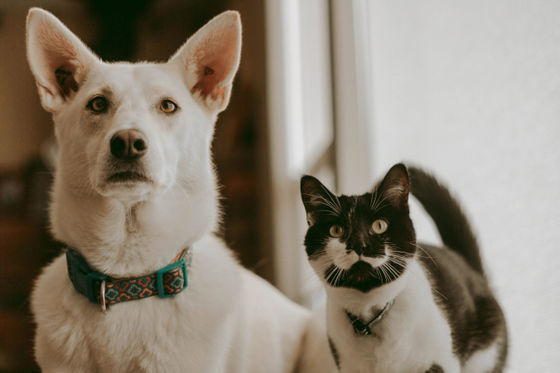Can pets and livestock produce 'mutants' of the new coronavirus?

Since the outbreak of the new coronavirus infection (COVID-19) pandemic in 2020, COVID-19 has been confirmed to infect
COVID variants: could dangerous new ones evolved in pets and farm animals?
https://theconversation.com/covid-variants-could-dangerous-new-ones-evolve-in-pets-and-farm-animals-163592
Since the beginning of 2021, various mutant strains of the new coronavirus have been rampant, and some of them reported that 'the incubation period is shorter than before and the viral load increases more than 1000 times'. Multiple high-risk mutant strains, such as strains, are also prevalent.
The delta mutant strain of the new corona was found to have 'a shorter incubation period and a 1000-fold increase in viral load than before' --GIGAZINE

The question that comes to mind with the epidemic of these mutant strains is 'Does the new coronavirus mutate in pets?' It is said that the new coronavirus does not cause as strong symptoms as humans when it infects animals, but infection has been confirmed in various animals.
Caddy, a veterinarian who studies viral immunology, answers these questions. According to Caddy, a number of studies are already underway on animal species infected with the new coronavirus, including details such as 'which species is infected' and 'which species is actually spreading'. Investigation has begun . At the research facility, experiments are being conducted to infect various livestock and wild species with the new coronavirus, and it is being investigated which animals can be infected with the new coronavirus.
On the other hand, in research on natural infections, cats and dogs, which are the most common pets, are the mainstream. According to a (PDF file) paper published in June 2021, only 6 of the 377 pet dogs and cats surveyed between November 2020 and February 2021 have antibodies to the new coronavirus. It was. From this, Caddy commented, 'It is unlikely that the infection has spread to domestic dogs and cats, and that they have not accumulated enough new coronavirus to produce mutant strains.' , I explained that there is no problem with dogs and cats.

Mink was mentioned by Caddy as an animal that could produce a mutant strain of the new coronavirus. Mink was confirmed as the first 'animal-to-human transmission case' of the new coronavirus, and in November 2020, the new coronavirus was actually transmitted from mink to humans in Denmark, which has the world's largest fur industry. It is an animal that has been confirmed to have a series of. Following a series of mink-derived infections, the Danish government decided to slaughter about 17 million domestic fur minks, but the burial mink came out of the grave during this slaughter. Also attracted a lot of attention.
Mass slaughtered mink comes out of the grave like a zombie-GIGAZINE

by dyrevern
Regarding mink, Caddy said, 'We need to keep an eye on it,' suggesting that mink-derived mutants can occur. Regarding the Danish government's response, 'the mink infection was rapidly suppressed,' he said, saying that it was effective in controlling the situation.
In addition, the virus mutates not only when it infects others, but also when it continues to survive for a long time in the body of an organism whose immunity is not fully functioning. When asked if the mutations that result from long-term survival in the body can occur in animals, Caddy said, 'Animals can also have weakened immunity for a variety of reasons, but the virus can evolve. The situation is rare, let alone in the case of wild animals, because weakened immunity makes it difficult to survive, so it is unlikely that the virus will survive long enough to evolve, but it is in the very early stages. (PDF file) Animal experiments have confirmed that small mutations have occurred, suggesting that the new coronavirus can cause mutations even when it is present in the body for only a short period of time. '
'When evidence of inter-animal or chronic transmission is found, strict controls need to be taken promptly,' Caddy said, adding that the same level of comprehensive control as humans is not needed. 'We need to be free from prejudice for the future,' he said.
Related Posts:







